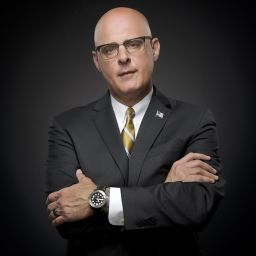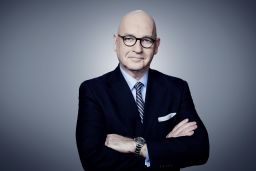The Washington Post reported last week that special counsel Robert Mueller has told President Donald Trump’s legal team that his office will likely seek an interview with the President. Trump indicated he might be willing to be interviewed by Mueller’s team, but more recently, he said, “We’ll see what happens.”
A high-stakes interview between Trump and the counsel appointed to investigate Russian interference in the 2016 election and the question of whether there were links to the Trump campaign would be a momentous political and legal occasion.
CNN Opinion asked James Gagliano, a retired FBI agent with two decades on the job, and Paul Callan, a former prosecutor, for their takes on whether Trump should meet with Mueller, and if so, under what circumstances.
Former FBI agent: Trump should testify
Many legal analysts, including Paul Callan, argue that no skilled attorney worth his salt would ever advise the President to agree to a sit-down interview with special counsel Robert Mueller. The most common – and safest – criminal defense strategy places a premium on limiting exposure for a client. A shut mouth catches no flies, as the old saying goes.
But I would argue for a more unconventional legal approach for a wholly unconventional President for these four reasons:
First, there is reason to believe that Mueller is not building a strong case against the President on the issue of collusion.

The indictments filed against Paul Manafort, Trump’s former campaign manager, and Rick Gates, Manafort’s business associate, were related to conspiracy and money laundering that allegedly took place before their work on the campaign. Meanwhile, Michael Flynn and George Papadopoulos pleaded guilty to lying to FBI agents – ancillary process crimes, which means that there was criminal conduct (lying) related to the investigation of a crime, but not complicity in the crime under investigation.
In other words, not one of the aforementioned Trump campaign associates have been charged in an underlying scheme related to illegal cooperation with the Kremlin to sway the election. That’s critical, because it could well mean that Trump only needs to fear potential obstruction of justice charges related to his interactions with his former FBI director, James Comey, or false statement charges if he explicitly lies to investigators.
For those inclined to believe the President, who has repeatedly proclaimed his innocence, the sage legal advice would be to help bring the special prosecutor’s investigation to a conclusion. Interviews of targets are generally the final act in a judicial melodrama. By agreeing to meet with investigators and telling the truth, the whole truth and nothing but the truth, Trump would help to close this chapter conclusively. And, hopefully, America would move on.
Second, if Trump and his attorneys know more specifics about the case Mueller may be attempting to build against him, they will be better positioned to counter potential allegations. Information is everything in the cat-and-mouse game that is our legal system.
In essence, Trump would be following the wise words of Sun Tzu, the Chinese military strategist, who argued that “if you know the enemy and know yourself, you need not fear the result of a hundred battles.”
Legal advice from White House lawyers is predicated on speculative analysis, or discerning just what specifically Mueller’s team is focusing its investigation on. Are investigators still fixated on rooting out evidence of a collusive relationship with Russia, or have they abandoned that endeavor and moved on? And if they have moved on, have they expanded the investigative scope, and are they now digging into Trump’s prior business dealings and tax compliance?
There’s only one way to find out – agree to an interview to glean as much as possible from the prosecution team’s line of questioning.
Third, Trump is supremely skilled at “truthful hyperbole,” which he wrote about extensively in “The Art of the Deal.” And he may be able to use that skill to avoid telling the whole truth, without compromising himself legally.
For background, Trump defines “truthful hyperbole” as “an innocent form of exaggeration.” And he explains it from a business perspective where imprecise language may be the key to branding, sales increases and profit margins.
This surely could serve as an effective means to not fully telling the whole truth, while evading the provable intention of lying when under oath or when speaking with FBI agents. To be convicted of perjury, an “intent” to deceive must be proven.
Proving “intent” is also a requirement for obstruction of justice charges.
When queried about his questionable instructions to Comey – in which Comey alleges Trump said, “I hope you can see your way clear to letting this go, to letting Flynn go.” – the President can use “truthful hyperbole” to slip that punch. Comey has described in detail his interactions with the President and quoted him in the infamous memorandum he leaked to The New York Times. And Trump, in response, could simply explain to Mueller’s investigators how he intended for his words to be taken and dismiss Comey’s attempts at intuition.
Finally, by agreeing to a sit-down with Mueller, Trump may ultimately win in the court of public opinion. In other words, he could prove he has nothing to hide, and his supporters would revel in his apparent transparency.
And, in fact, if Mueller cannot prove collusion, it will bolster Trump’s argument he is the victim of a political witch hunt and efforts by the media and his political opponents to undermine his administration. This may even garner him additional favor.
So, if Trump wants to bring this saga to an end – and maybe even boost his poll numbers – he should agree to speak to Mueller.
James Gagliano is a CNN law enforcement analyst and a retired FBI supervisory special agent. He also is an adjunct assistant professor at St. John’s University in Queens, New York. The views expressed in this commentary are his own.
Former prosecutor: Trump should not testify
Former FBI Special Agent James Gagliano suggests that such presidential testimony might be a good idea. I strongly disagree. Any of Trump’s personal attorneys recommending he submit to questioning by Mueller’s highly skilled team of prosecutors and investigators would be suggesting an action fraught with legal risk. The President’s uncontrolled rhetoric might well position him for impeachment, followed by potential criminal charges.

When Mueller is around, silence should be Trump’s golden rule.
The ‘sneak preview’ argument
Gagliano believes that the occasionally charming President may be able to talk his way out of criminal or impeachable charges because the evidence of “collusion” may be weak. And, in the process, Gagliano argues, Trump could also get a sneak preview of Mueller’s case.
In that same vein, the President will have the opportunity to offer an explanation for his numerous suspicious actions. For example, maybe when the President allegedly dictated Donald Trump Jr.’s press release about the Trump Tower meeting with Russians, he really didn’t know that his son set it up to get dirt on Hillary Clinton from a Russian agent.
Of course, to offer that defense, the President would have to throw his own son under the bus. Donald Jr., according to his own congressional testimony, discussed the emails setting up the Trump Tower meeting with the President. Though declining to answer detailed questions about the discussion, it appears that either the younger Trump or the President himself deceptively characterized the purpose of the meeting as a discussion of Russian adoption policies.
So, here’s the reality: In the President’s situation, it is only the prosecutors who will get the free look at Trump’s defense case, as he is led to the political gallows. And, in such a meeting, he might be compelled to incriminate his own family to protect himself.
Also, as Mueller’s investigation expands beyond Russian meddling, Trump’s “red line” regarding no questioning or investigation of the pre-election Trump Organization, his family business, might be crossed. In other words, Mueller could ask Trump questions that extend far beyond collusion and might prove his involvement or complicity in pre-campaign financial crimes. And if you need any further proof, consider that the No. 2 person selected to run the investigation in the special counsel’s office is a money laundering-fraud expert, Andrew Weissmann.
The myth of truthful hyperbole
The President actually did use the term “truthful hyperbole” in “The Art of the Deal,” the famous ghostwritten best-seller about his early career. In his own words: “The final key to the way I promote is bravado. … I play to people’s fantasies. People may not always think big themselves, but they can still get very excited by those who do. That’s why a little hyperbole never hurts. People want to believe that something is the biggest and the greatest and the most spectacular. I call it truthful hyperbole. It’s an innocent form of exaggeration – and a very effective form of promotion.”
Being questioned by some of the nation’s top prosecutors and FBI agents is not like selling real estate to a fanaticizing rube waiting to be played. These folks have a word for what the President describes as “truthful hyperbole.” It’s called “perjury” if it happens under oath, or “false statements” if the lying to the FBI takes place in a more informal setting. Both are felonies and impeachable offenses to boot.
And, remember, the President’s reputation for truth telling is not exactly stellar. Dressing up a lie by calling it “truthful hyperbole” is not a defense; it’s a confession that Trump intentionally used exaggerated facts he knew to be untrue to “play to people’s fantasies” – and, in the process, make money for himself.
Though if there is any doubt that the lying is an unusual activity by the President, one need only look at his campaign record and his first months in office. The New York Times recently published a detailed account of what they claim to be more 100 certifiable examples of lies during Trump’s first 10 months in office. All could potentially be used to undermine his credibility.
And during the campaign, Politifact published a survey indicating that 70% of Trump’s campaign statements contained verifiable falsehoods. Politico wrote that the results of that survey suggest the “sheer frequency, spontaneity and seeming irrelevance of his lies have no precedent” in presidential campaign history.
Since questioning about prior lies would be fair game, the process of preparing the President for a Mueller session would be extraordinarily difficult – and not worth the risk to Trump or his family.
The court of public opinion
Even if the President can be subpoenaed in the Mueller investigation, a final escape route remains – he could and should plead the Fifth. The conventional political advice is that politicians can’t assert the Fifth because it makes them look like crooks. This advice does not apply to Trump whose baseline supporters, making up as much as 30% to 35% of the electorate, think the federal agents investigating the President are “crooks” out to frame him for daring to attack the entrenched liberal bureaucracy.
In other words, if Trump asserts the Fifth, he will not lose the support. In fact, his support may increase. Under these circumstances, Trump’s attorneys would be wise to advise him not to testify. Whether the unpredictable President will follow such legal advice is anybody’s guess. And who knows? Maybe he’ll be questioned by a friendly FBI agent who believes in “truthful hyperbole” and the value of buildings named “Trump.”
Paul Callan is a CNN legal analyst, a former New York homicide prosecutor and current counsel at the New York law firm of Edelman & Edelman PC, focusing on wrongful conviction and civil rights cases. Follow him on Twitter @paulcallan. The views expressed in this commentary are his own.





